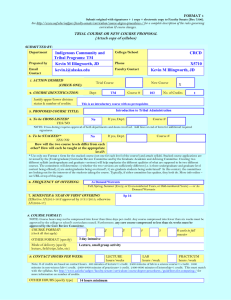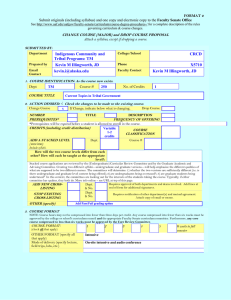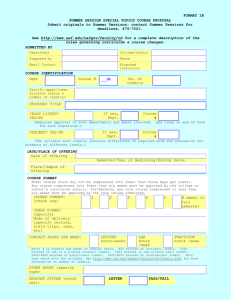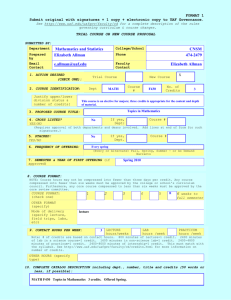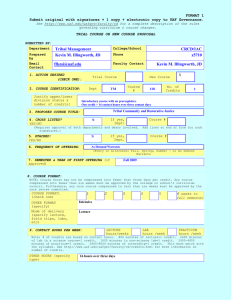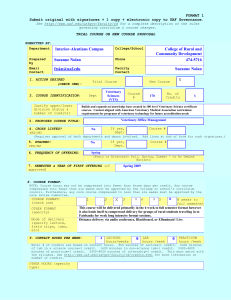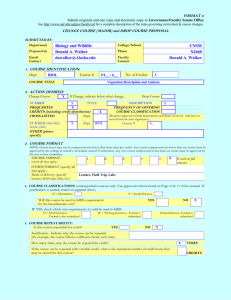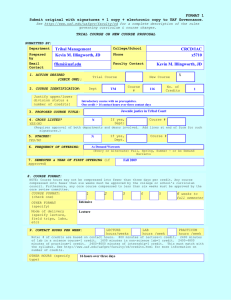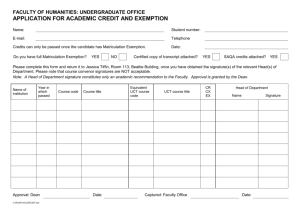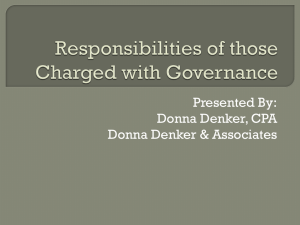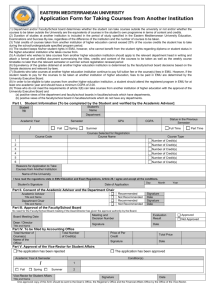FORMAT 1B - Submit original with signatures only
advertisement
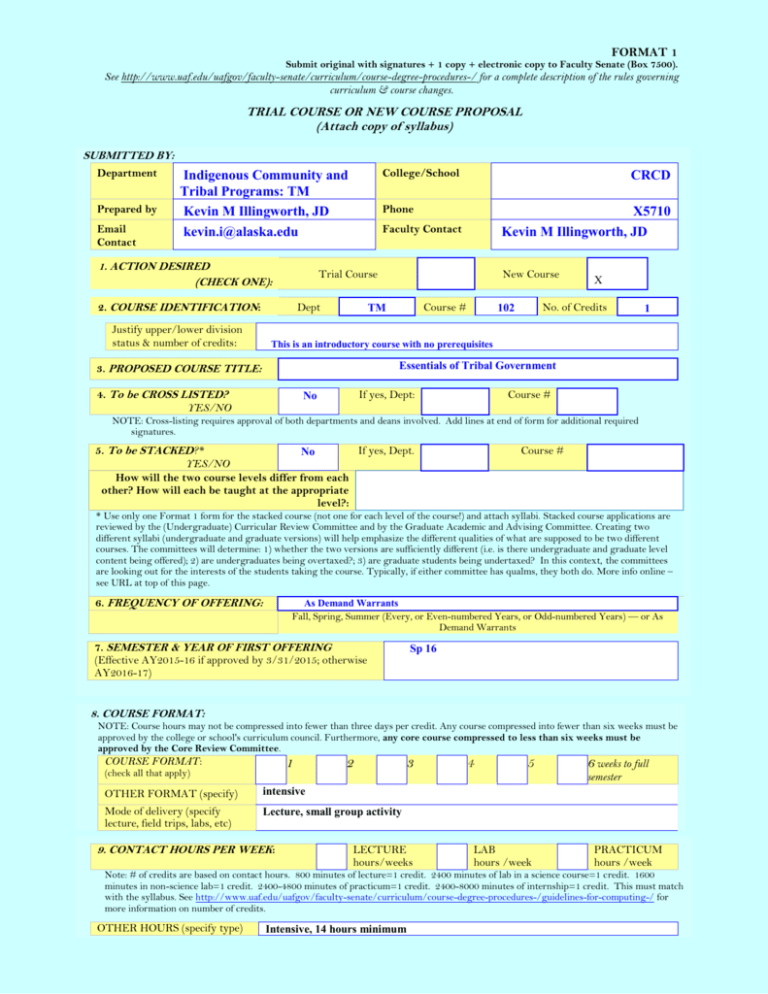
FORMAT 1 Submit original with signatures + 1 copy + electronic copy to Faculty Senate (Box 7500). See http://www.uaf.edu/uafgov/faculty-senate/curriculum/course-degree-procedures-/ for a complete description of the rules governing curriculum & course changes. TRIAL COURSE OR NEW COURSE PROPOSAL (Attach copy of syllabus) SUBMITTED BY: Department Prepared by Email Contact College/School Indigenous Community and Tribal Programs: TM Kevin M Illingworth, JD kevin.i@alaska.edu 1. ACTION DESIRED (CHECK ONE): Phone X5710 Kevin M Illingworth, JD Faculty Contact Trial Course 2. COURSE IDENTIFICATION: Justify upper/lower division status & number of credits: CRCD Dept New Course Course # TM X No. of Credits 102 1 This is an introductory course with no prerequisites Essentials of Tribal Government 3. PROPOSED COURSE TITLE: 4. To be CROSS LISTED? YES/NO If yes, Dept: No Course # NOTE: Cross-listing requires approval of both departments and deans involved. Add lines at end of form for additional required signatures. If yes, Dept. 5. To be STACKED?* No YES/NO How will the two course levels differ from each other? How will each be taught at the appropriate level?: Course # * Use only one Format 1 form for the stacked course (not one for each level of the course!) and attach syllabi. Stacked course applications are reviewed by the (Undergraduate) Curricular Review Committee and by the Graduate Academic and Advising Committee. Creating two different syllabi (undergraduate and graduate versions) will help emphasize the different qualities of what are supposed to be two different courses. The committees will determine: 1) whether the two versions are sufficiently different (i.e. is there undergraduate and graduate level content being offered); 2) are undergraduates being overtaxed?; 3) are graduate students being undertaxed? In this context, the committees are looking out for the interests of the students taking the course. Typically, if either committee has qualms, they both do. More info online – see URL at top of this page. 6. FREQUENCY OF OFFERING: As Demand Warrants Fall, Spring, Summer (Every, or Even-numbered Years, or Odd-numbered Years) — or As Demand Warrants 7. SEMESTER & YEAR OF FIRST OFFERING (Effective AY2015-16 if approved by 3/31/2015; otherwise AY2016-17) Sp 16 8. COURSE FORMAT: NOTE: Course hours may not be compressed into fewer than three days per credit. Any course compressed into fewer than six weeks must be approved by the college or school's curriculum council. Furthermore, any core course compressed to less than six weeks must be approved by the Core Review Committee. 1 COURSE FORMAT: (check all that apply) 2 3 4 5 6 weeks to full semester OTHER FORMAT (specify) intensive Mode of delivery (specify lecture, field trips, labs, etc) Lecture, small group activity 9. CONTACT HOURS PER WEEK: LECTURE hours/weeks LAB hours /week PRACTICUM hours /week Note: # of credits are based on contact hours. 800 minutes of lecture=1 credit. 2400 minutes of lab in a science course=1 credit. 1600 minutes in non-science lab=1 credit. 2400-4800 minutes of practicum=1 credit. 2400-8000 minutes of internship=1 credit. This must match with the syllabus. See http://www.uaf.edu/uafgov/faculty-senate/curriculum/course-degree-procedures-/guidelines-for-computing-/ for more information on number of credits. OTHER HOURS (specify type) Intensive, 14 hours minimum 10. COMPLETE CATALOG DESCRIPTION including dept., number, title, credits, credit distribution, cross-listings and/or stacking (50 words or less if possible): Example of a complete description: FISH F487 W, O Fisheries Management 3 Credits Offered Spring Theory and practice of fisheries management, with an emphasis on strategies utilized for the management of freshwater and marine fisheries. Prerequisites: COMM F131X or COMM F141X; ENGL F111X; ENGL F211X or ENGL F213X; ENGL F414; FISH F425; or permission of instructor. Cross-listed with NRM F487. (3+0) TM 102 Essentials of Tribal Government 1 credit As Demand Warrants This course will provide an overview of tribal council executive, legislative and judicial responsibilities. Including tribal council role in writing laws, basics of tribal sovereignty, sovereign immunity, and rights of tribal members. 11. COURSE CLASSIFICATIONS: Undergraduate courses only. Consult with CLA Curriculum Council to apply S or H classification appropriately; otherwise leave fields blank. H = Humanities S = Social Sciences Will this course be used to fulfill a requirement for the baccalaureate core? If YES, attach form. YES: NO: IF YES, check which core requirements it could be used to fulfill: O = Oral Intensive, Format 6 W = Writing Intensive, Format 7 X = Baccalaureate Core 11.A Is course content related to northern, arctic or circumpolar studies? If yes, a added in the printed Catalog, and flagged in Banner. YES NO X “snowflake” symbol will be 12. COURSE REPEATABILITY: Is this course repeatable for credit? YES Justification: Indicate why the course can be repeated (for example, the course follows a different theme each time). X NO Course content can vary based on current and important issues facing tribal administrators and council members How many times may the course be repeated for credit? 2 If the course can be repeated for credit, what is the maximum number of credit hours that may be earned for this course? If the course can be repeated with variable credit, what is the maximum number of credit hours that may be earned for this course? 2 TIMES CREDITS CREDITS 13. GRADING SYSTEM: Specify only one. Note: Changing the grading system for a course later on constitutes a Major Course Change – Format 2 form. LETTER: PASS/FAIL: X RESTRICTIONS ON ENROLLMENT (if any) None 14. PREREQUISITES These will be required before the student is allowed to enroll in the course. 15. SPECIAL RESTRICTIONS, CONDITIONS 16. PROPOSED COURSE FEES $0 Has a memo been submitted through your dean to the Provost for fee approval? Yes/No 17. PREVIOUS HISTORY Has the course been offered as special topics or trial course previously? Yes/No Y If yes, give semester, year, course #, etc.: TM 250 Current Topics 18. ESTIMATED IMPACT WHAT IMPACT, IF ANY, WILL THIS HAVE ON BUDGET, FACILITIES/SPACE, FACULTY, ETC. None, this course will be offered either using existing faculty or with adjuncts provided by regional nonprofits. 19. LIBRARY COLLECTIONS Have you contacted the library collection development officer (kljensen@alaska.edu, 474-6695) with regard to the adequacy of library/media collections, equipment, and services available for the proposed course? If so, give date of contact and resolution. If not, explain why not. No Yes X No library collections utilized in 3 day class 20. IMPACTS ON PROGRAMS/DEPTS What programs/departments will be affected by this proposed action? Include information on the Programs/Departments contacted (e.g., email, memo) Tribal Management 21. POSITIVE AND NEGATIVE IMPACTS Please specify positive and negative impacts on other courses, programs and departments resulting from the proposed action. This class will provide the positive impact of providing course credit for a high quality academic course, bringing new students into the University, many of whom would not be taking classes otherwise. This course will better prepare new students for success in core TM classes. No negative impacts are expected. JUSTIFICATION FOR ACTION REQUESTED The purpose of the department and campus-wide curriculum committees is to scrutinize course change and new course applications to make sure that the quality of UAF education is not lowered as a result of the proposed change. Please address this in your response. This section needs to be self-explanatory. Use as much space as needed to fully justify the proposed course. This course was created in response to repeated requests from tribal governments and non-profits to create a 1-credit intensive course that focuses on the essential governmental practices and knowledge important to new tribal council members. APPROVALS: Add additional signature lines as needed. Date Signature, Chair, Program/Department of: Date Signature, Chair, College/School Curriculum Council for: Date Signature, Dean, College/School of: Offerings above the level of approved programs must be approved in advance by the Provost. Date Signature of Provost (if above level of approved programs) ALL SIGNATURES MUST BE OBTAINED PRIOR TO SUBMISSION TO THE GOVERNANCE OFFICE Date Signature, Chair Faculty Senate Review Committee: ___Curriculum Review ___Core Review ___GAAC ___SADAC ADDITIONAL SIGNATURES: (As needed for cross-listing and/or stacking) Date Signature, Chair, Program/Department of: Date Signature, Chair, College/School Curriculum Council for: Date Signature, Dean, College/School of: ATTACH COMPLETE SYLLABUS (as part of this application). This list is online at: http://www.uaf.edu/uafgov/faculty-senate/curriculum/course-degree-procedures-/uaf-syllabus-requirements/ The Faculty Senate curriculum committees will review the syllabus to ensure that each of the items listed below are included. If items are missing or unclear, the proposed course (or changes to it) may be denied. SYLLABUS CHECKLIST FOR ALL UAF COURSES During the first week of class, instructors will distribute a course syllabus. Although modifications may be made throughout the semester, this document will contain the following information (as applicable to the discipline): 1. Course information: Title, number, credits, prerequisites, location, meeting time (make sure that contact hours are in line with credits). 2. Instructor (and if applicable, Teaching Assistant) information: Name, office location, office hours, telephone, email address. 3. Course readings/materials: Course textbook title, author, edition/publisher. Supplementary readings (indicate whether required or recommended) and any supplies required. 4. Course description: Content of the course and how it fits into the broader curriculum; Expected proficiencies required to undertake the course, if applicable. Inclusion of catalog description is strongly recommended, and Description in syllabus must be consistent with catalog course description. 5. Course Goals (general), and (see #6) 6. Student Learning Outcomes (more specific) 7. Instructional methods: Describe the teaching techniques (eg: lecture, case study, small group discussion, private instruction, studio instruction, values clarification, games, journal writing, use of Blackboard, audio/video conferencing, etc.). 8. Course calendar: A schedule of class topics and assignments must be included. Be specific so that it is clear that the instructor has thought this through and will not be making it up on the fly (e.g. it is not adequate to say “lab”. Instead, give each lab a title that describes its content). You may call the outline Tentative or Work in Progress to allow for modifications during the semester. 9. Course policies: Specify course rules, including your policies on attendance, tardiness, class participation, make-up exams, and plagiarism/academic integrity. 10. Evaluation: Specify how students will be evaluated, what factors will be included, their relative value, and how they will be tabulated into grades (on a curve, absolute scores, etc.) Publicize UAF regulations with regard to the grades of "C" and below as applicable to this course. (Not required in the syllabus, but is a convenient way to publicize this.) Link to PDF summary of grading policy for “C”: http://www.uaf.edu/files/uafgov/Info-to-Publicize-C_Grading-Policy-UPDATED-May-2013.pdf 11. Support Services: Describe the student support services such as tutoring (local and/or regional) appropriate for the course. 12. Disabilities Services: Note that the phone# and location have been updated. http://www.uaf.edu/disability/ The Office of Disability Services implements the Americans with Disabilities Act (ADA), and ensures that UAF students have equal access to the campus and course materials. State that you will work with the Office of Disabilities Services (208 WHITAKER BLDG, 474-5655)to provide reasonable accommodation to students with disabilities. 5/21/2013
